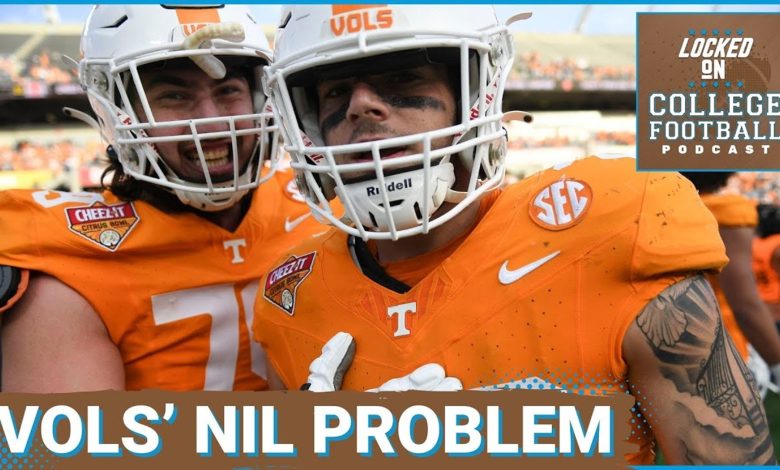If Tennessee prioritizes state law over NCAA NIL rules, it risks SEC expulsion and major consequences for its athletics program.

In the rapidly evolving world of college athletics, name, image, and likeness (NIL) rules have transformed how programs operate, recruit, and compete. But as federal inaction and conflicting state laws create a patchwork of regulations, tensions are boiling over between individual states and governing bodies like the NCAA and conferences like the SEC. Now, the University of Tennessee finds itself at the center of that storm — and if it continues prioritizing state NIL laws over conference and NCAA guidelines, the consequences could be historic.
According to multiple industry sources and reports, Tennessee’s steadfast commitment to following its own state law — which currently allows schools more latitude in NIL negotiations than what the NCAA permits — could put it at direct odds with the Southeastern Conference. In fact, insiders warn that if Tennessee refuses to align with SEC-wide NIL protocols, the school could face a nuclear option: expulsion from the conference it helped build.
A Clash Between State Law and Conference Authority
Tennessee’s NIL law, like those passed in other southern states, was designed to protect the state’s flagship universities from being hamstrung in the new era of athlete compensation. It empowers collectives and institutions to engage more directly with athletes and removes several barriers that the NCAA has tried to maintain in its guidelines. However, the SEC, under Commissioner Greg Sankey, has made it clear: all 16 member schools must operate under a unified standard to preserve competitive balance and avoid legal chaos.
“The problem,” one SEC administrator told The Athletic, “is that if one school operates under a totally different set of NIL rules, the rest of the league can’t compete on a level playing field. If Tennessee is allowed to do things Alabama, Georgia, or Florida can’t — what are we even doing?”
Commissioner Sankey has echoed this concern publicly and privately, urging state lawmakers across the SEC footprint to either standardize NIL rules or defer to federal legislation if and when it arrives. But in Tennessee, where state legislators view the NCAA as an overreaching bureaucracy, there has been little appetite for compromise. In fact, some Tennessee lawmakers have encouraged the university to “stand up” to the SEC and NCAA — a sentiment that plays well politically but could cost the school dearly.
Tennessee’s Position: Defiant but Isolated
So far, University of Tennessee officials have stood by their compliance with state law. Athletics Director Danny White has not publicly stated that the school will refuse to follow future SEC guidelines, but there’s been no signal that the school plans to tighten its NIL operations, either.
Behind the scenes, Tennessee’s collective — Spyre Sports Group — has emerged as one of the most aggressive and organized in the country. The group has facilitated multimillion-dollar NIL deals and become a recruiting force. That success has raised eyebrows across the conference, with rivals accusing Tennessee of skirting fair competition under the guise of legal loopholes.
“This isn’t about athletes making money — we all support that,” said one SEC coach. “This is about how that money is managed. Tennessee’s setup gives them a massive edge, and if they’re not willing to follow the same rules, there needs to be consequences.”
That warning isn’t just rhetoric. According to several reports, SEC leadership has discussed internally the possibility of imposing sanctions — or, in an extreme scenario, recommending removal — if a school consistently refuses to comply with league-wide NIL policies. While no formal action has been taken, the mere existence of such conversations underscores how serious the situation has become.
Can the SEC Really Expel a Member School?
On paper, the SEC constitution allows for disciplinary action, including removal, for member schools that act against the interests or integrity of the conference. Expulsion, however, would be unprecedented. Tennessee is one of the founding members of the SEC and has deep historical and financial ties to the conference. Removing a school of its stature would be seismic — both symbolically and economically.
Still, legal experts say it’s not out of the question.
“If the University of Tennessee actively undermines the policies of the SEC — and does so after repeated warnings — the conference would have grounds to impose sanctions, including suspension or expulsion,” said attorney Michael Buckner, who specializes in sports compliance law. “It would be messy, but it’s legally feasible.”
The bigger question may be whether Sankey and SEC presidents have the political will to take such a drastic step. So far, Sankey has maintained a firm but diplomatic tone, focusing on consensus-building. But as other member schools express frustration and demand enforcement, that approach may not hold.
What’s at Stake for Tennessee?
For Tennessee, the risks of defying the SEC are massive. The university earns tens of millions annually through conference revenue-sharing agreements tied to television contracts, bowl appearances, and the SEC Network. Expulsion or suspension would cut off that pipeline — a financial catastrophe for any athletic department.
Moreover, being booted from the SEC would devastate recruiting. No longer able to promise prospects the chance to compete in the nation’s premier football conference, Tennessee’s football and basketball programs would lose their most powerful selling point. The ripple effects would touch every sport, every donor, and every administrator.
There’s also the matter of pride. Tennessee fans are among the most passionate in the country, and while many enjoy the state’s defiant stance toward the NCAA, few would support a move that ends with the Vols playing in the Sun Belt or as an independent. The SEC is more than a conference — it’s a cultural identity in Knoxville.
“I’m all for athletes getting paid,” said one longtime Tennessee booster, “but not at the cost of leaving the SEC. That would be a disaster.”
The Bigger Picture: NIL Chaos and the Need for Federal Oversight
Tennessee’s standoff with the SEC is just one example of the broader dysfunction surrounding NIL in college sports. With each state writing its own rules and the NCAA increasingly toothless, schools are left to navigate a chaotic landscape that varies by geography. The result is not only competitive imbalance, but legal vulnerability.
The NCAA has lobbied Congress for a uniform federal NIL law, but progress has been slow. Several bills have been proposed — including one by Senators Tommy Tuberville (R-AL) and Joe Manchin (D-WV) — but none have made it through both chambers. Until that changes, schools and conferences are left to sort it out themselves.
That vacuum has turned NIL into the wild west — and Tennessee, intentionally or not, has become the sheriff nobody else voted for.
“If Congress doesn’t act,” one SEC source said, “then the conference has to — or the whole thing collapses.”
Is a Compromise Possible?
Despite the high stakes, there is still hope for compromise. Some insiders believe the SEC will ultimately craft a set of NIL guidelines that allow for some state-specific flexibility while maintaining core standards. Tennessee, in turn, may quietly scale back some of its more aggressive practices to avoid direct confrontation.
University leadership could also lean on state lawmakers to amend the current NIL law to align more closely with SEC expectations, giving everyone a face-saving off-ramp.
But such a compromise would require political courage — and a willingness from all parties to prioritize long-term stability over short-term gain.
Conclusion: Tennessee’s Moment of Truth
The University of Tennessee has built one of the most successful NIL ecosystems in the country, helping it land top recruits and revitalize its athletic programs. But that success now comes with a steep price. If the school continues to prioritize state NIL law over conference and NCAA guidelines, it risks more than just sanctions — it risks exile.
For a founding member of the SEC, that’s almost unthinkable. But in the modern era of college athletics, where money, politics, and power collide, nothing is off the table.
The next few months will be critical. Tennessee must decide whether to play by the rules of the league it helped build — or walk alone into uncertain territory.
Because in the SEC, the message is becoming clear: align, adapt, or step aside.









